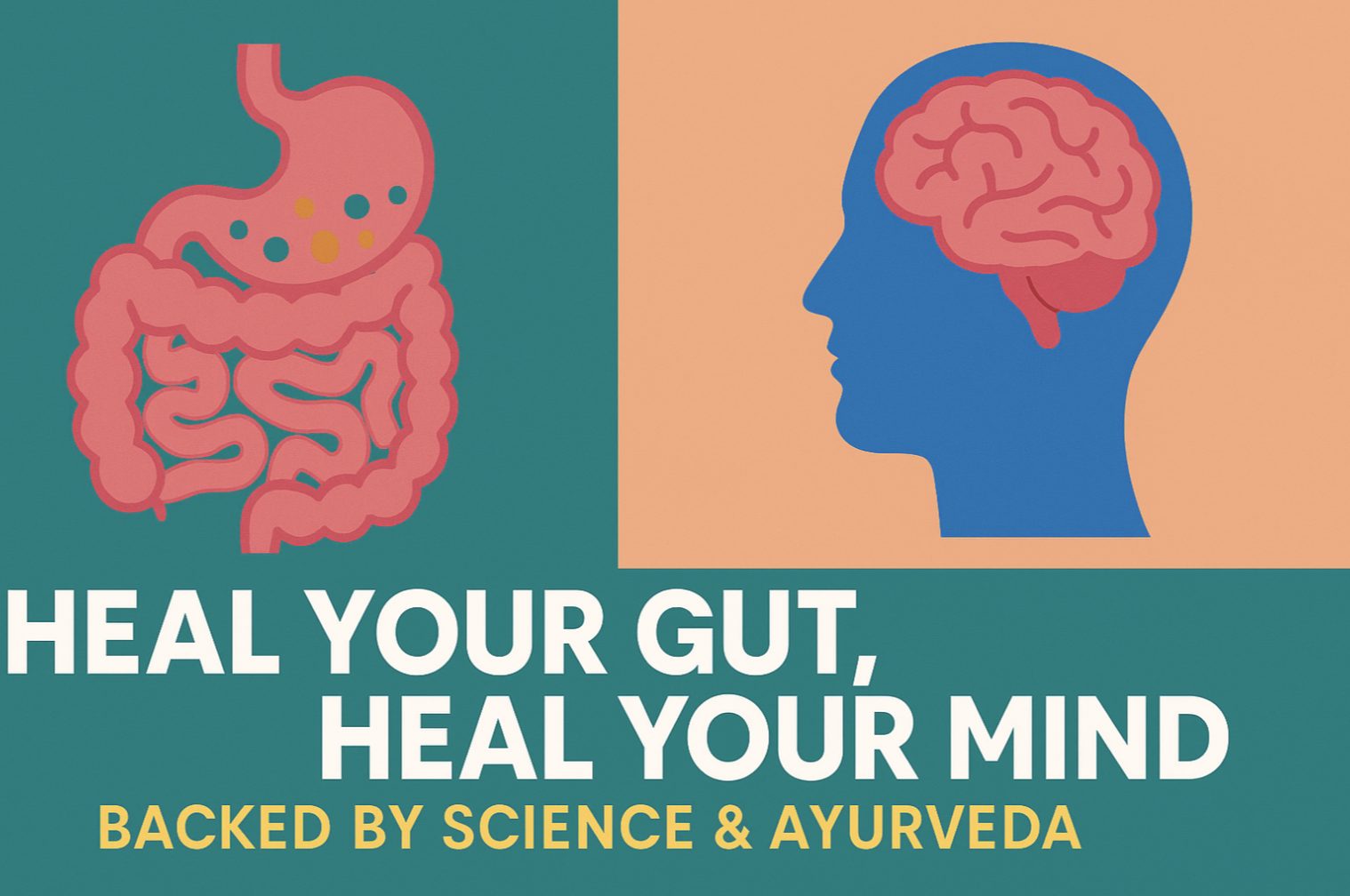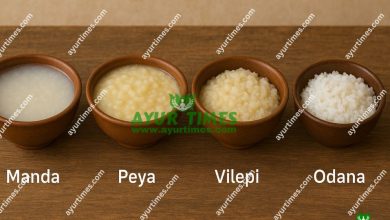Heal Your Gut, Heal Your Mind: Backed by Science & Ayurveda

Have you ever felt mentally foggy or emotionally drained after eating a heavy meal? Or calm and energised after a clean, wholesome dish? You’re not imagining it. Your gut is directly connected to your brain, influencing how you feel, think, and function.
Modern neuroscience calls this the gut-brain axis—a complex communication system linking the emotional and cognitive centres of the brain with intestinal functions. But long before science validated this connection, Ayurveda—the ancient Indian system of medicine—already knew that digestion and mental health are intimately intertwined.
This article explores the fascinating connection between your gut and your mind, drawing from both cutting-edge science and timeless Ayurvedic wisdom to help you nourish both for greater well-being.
Part 1: The Science of the Gut-Brain Connection
The Gut-Brain Axis Explained
Your brain and gut are connected through a network of nerves, hormones, and immune pathways. The vagus nerve, in particular, acts like a highway that sends signals in both directions. What happens in the gut doesn’t stay in the gut—it travels straight to your brain.
Enter the Microbiome
Inside your intestines live over 100 trillion bacteria, collectively known as the gut microbiome. These bacteria help with digestion—but they also play a key role in mood regulation. How?
- They produce neurotransmitters like serotonin, dopamine, and GABA—all essential for emotional stability and cognitive function.
- They regulate inflammation, which has been linked to conditions like depression, anxiety, and even Alzheimer’s.
- They influence your stress response, often worsening or improving it depending on gut health.
Fact: Around 90% of serotonin, the “feel-good” neurotransmitter, is produced in your gut—not your brain.
Part 2: Symptoms of Poor Gut Health Affecting the Mind
You might be surprised to know that mental symptoms often stem from digestive imbalances.
| Symptom | Gut-Related Cause |
|---|---|
| Brain fog | Leaky gut, blood sugar instability |
| Anxiety | Imbalance in gut bacteria, low GABA |
| Depression | Inflammation, serotonin dysregulation |
| Fatigue | Poor nutrient absorption |
| Irritability | Blood sugar crashes, food sensitivities |
Part 3: The Ayurvedic Perspective — Gut as the Seat of Health
In Ayurveda, the gut is known as the home of Agni, or digestive fire. According to classical Ayurvedic texts:
“Rogah Sarve Api Mande Agnau” — All diseases begin with impaired digestion.
— Charaka Samhita, Sutra Sthana 28.4
Ayurveda teaches that a strong Agni ensures proper digestion, assimilation, and elimination. When Agni is weak, undigested food forms Ama, a toxic sludge that clogs the system—physically and mentally.
Agni and the Mind (Manas)
Agni doesn’t just digest food; it also digests sensory input, emotions, and experiences. Weak digestive fire leads to mental dullness, confusion, anxiety, or depression. This is why Ayurvedic treatments for the mind often begin with the gut.
Part 4: How the Doshas Influence Gut and Mood
Each dosha (Vata, Pitta, Kapha) influences digestion differently—and each has specific emotional and gut-based imbalances.
| Dosha | Gut Imbalance | Mental Effect | Food Recommendations |
|---|---|---|---|
| Vata | Irregular digestion, bloating | Anxiety, restlessness | Warm, moist, grounding foods |
| Pitta | Acidic digestion, inflammation | Irritability, anger | Cooling, bitter, soothing foods |
| Kapha | Slow, heavy digestion | Lethargy, depression | Light, warm, spicy foods |
Part 5: 10 Ways to Nourish Your Gut and Mind Naturally
Here’s how to restore balance using both modern science and Ayurvedic wisdom:
1. Eat Whole, Unprocessed Foods
Minimise sugar, processed oils, and preservatives that feed harmful gut bacteria.
2. Add Probiotics and Prebiotics
- Probiotic foods: Yogurt, kefir, sauerkraut, miso
- Prebiotic foods: Garlic, leeks, asparagus, green bananas
3. Follow Ayurvedic Meal Timing
Eat your largest meal at lunch when Agni is strongest. Avoid late-night eating.
4. Use Ayurvedic Herbs
- Triphala: Gentle detox, improves gut motility
- Ashwagandha: Reduces cortisol, supports gut-brain balance
- Brahmi: Improves mental clarity
- Licorice root: Soothes the gut lining and nervous system
5. Start Your Day with Warm Lemon Water
Kick-starts digestion and balances pH.
6. Avoid Incompatible Food Combinations
Milk with salty foods, fruit with dairy—these are discouraged in Ayurveda.
7. Chew Thoroughly and Eat Mindfully
Digestion begins in the mouth. Chewing well reduces Ama formation.
8. Sip CCF Tea Throughout the Day
Made of Cumin, Coriander, Fennel—this classic blend strengthens Agni and calms the mind.
9. Practice Pranayama and Yoga
Gentle breathing and movement regulate the vagus nerve and digestion.
10. Prioritise Sleep and Reduce Screen Time at Night
Poor sleep disrupts gut flora and increases cortisol, negatively impacting both gut and mind.
Final Thoughts: A Clearer Mind Starts in the Gut
Whether you’re dealing with mood swings, anxiety, fatigue, or brain fog, don’t just look to the mind—start with the gut. Modern research and Ayurvedic texts agree: when digestion is balanced, the mind follows. By combining nourishing foods, mindful habits, and Ayurvedic wisdom, you can experience greater mental clarity, emotional stability, and overall vitality.
“Let food be thy medicine,” Hippocrates once said. In Ayurveda, this has always been true.

